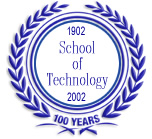
"Technology
and Us"
School of Technology
Centennial Symposium
An Extended Celebration

 |
"Technology
and Us" |
 |
|
|
The Role
of Technology and Learning: Michael
R. Hoadley, Ph.D.
Today the field of education is experiencing a period of great transformation and liberation due to the use of new and emerging technologies. A classroom is no longer limited by physical space because the Internet provides an avenue for connecting with people all over the world. The arrival of the microcomputer to the desktop has provided a powerful means for analyzing data, processing information, and sharing results in ways never imagined before. Electronic field trips, email, access to databases, chat sessions, discussion boards, multimedia presentations, videoconferencing, and connectivity to libraries also make learning possible in new and exciting ways. Of course, technology by itself is merely a way of delivery and part of the methodology or strategy employed by a teacher to enhance the learning process. Another key element to using technology effectively has been the development of a new definition of roles for the teacher and the student. Terms like facilitator, collaboration, communicator, and teamwork become increasingly important in a learning environment where access becomes a powerful equalizer in this age of information technology. This
chapter will explore the evolution of education and how technology has
played a key role in changing the learning process. The discussion will
focus on the needs of different students for learning in a variety of
environments: face-to-face, computer-mediated, online, technology-enhanced,
and distance-delivered. The roles of educators will also be explored and
discussed, especially in relationship to a change in philosophy about
how learning can be enhanced through a learner-centered approach utilizing
technology. As part of the change process, the necessity for building
communities in cyberspace to meet the social and educational needs of
society will also be addressed. |